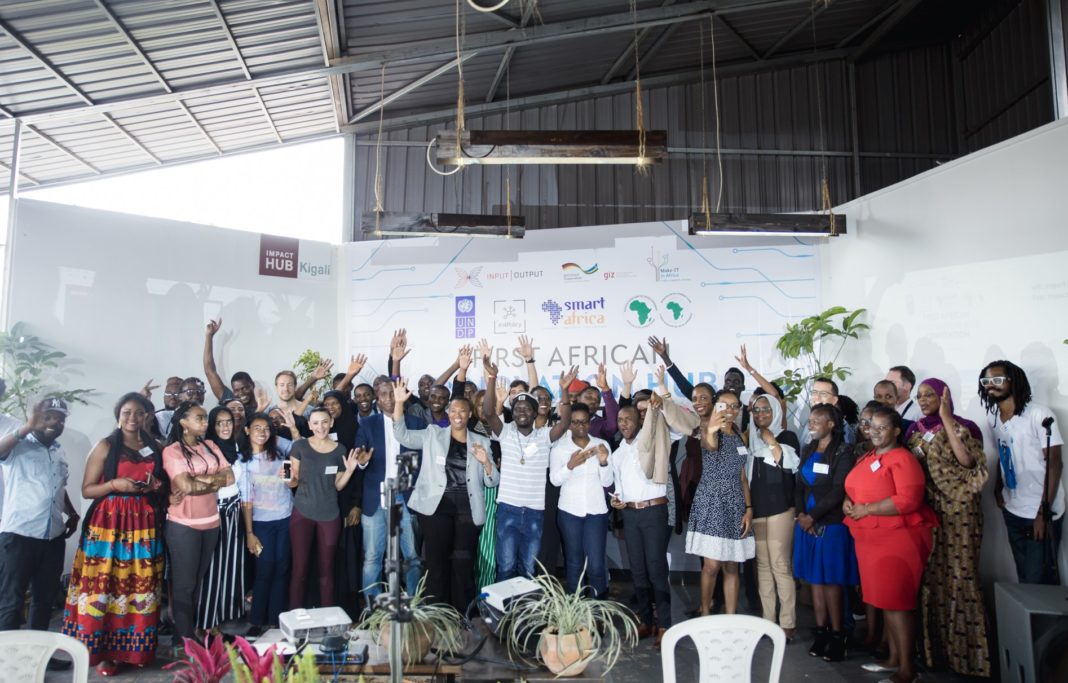About 90 innovation hubs representing more than 450,000 innovators and networks across 32 countries have endorsed the African Innovation Policy Manifesto in Kigali Rwanda.
The representatives of the innovation groups were in Rwanda, to co-design better innovation and entrepreneurship policies.
The event was organized on the sidelines of the Transform Africa Summit in Kigali that took place from May 8-9 under the theme “Accelerating Africa’s Single Digital Market”.
The Summit brought together stakeholders within the ICT space in the continent to discuss the role and power of digital technologies, including blockchain, the Internet of Things (IoT), Big Data, Artificial Intelligence, Virtual and Augmented reality, among others.
Participants discussed key public policy areas and to co-write the i4policy communiqué in view of accelerating digital transformation and contributing to more equitable, inclusive and sustainable development of economies and societies. Participants took ownership of the sessions by leading and facilitating the discussions as well as volunteering to translate for their French-speaking peers.
The first version of the i4policy vision was first drafted in October 2016 when a smaller group of African innovation hubs, bloggers, entrepreneurs and community catalysts, met in Kigali to discuss their public policy challenges.
The current manifesto was achieved through collaborative discussions, with input from the innovation hub managers physically at the event, as well as communities participating virtually from across the continent.
The policy manifesto focuses on seven key areas: education, research and development; digital infrastructure; public multidisciplinary spaces; business registration; finance for innovation and entrepreneurship; local and regional markets; and taxation systems.
The African Innovation Hub Convention was also an opportunity for the leaders of existing hub networks and associations active around the continent to share their work and progress with the gathering, with a view to strengthening existing networks and ties between innovation communities on content as well as policy visions.
Rym Jarou, the Talent and Capacity Building Manager at Smart Tunisia spoke about how the recently passed Tunisian Startup Act came to be and shared learnings from that process that can serve as a useful example for startup ecosystems and their respective policy makers across the continent.
“It is time for innovation for policy in Africa”, said Markos Lemma from Iceaddis, Ethiopia. “We are not asking our governments to listen to us anymore. Instead, we will work with them to co-create policies that work for the innovation community. It is not a demand-supply relationship we want to have with policy makers. We want to have a relationship of cooperation and collaboration,” she said.
The hub gathering was co-organised by i4policy, Jamaafunding, Kumasi Hive, the African Agribusiness Incubator Network and Impact Hub Kigali with support from Deutsche Gesellschaft für Internationale Zusammenarbeit (GIZ), the International Organization of la Francophonie (OIF), the United Nations Development Programme (UNDP) and the African Development Bank Group (AfDB) among others.The African Union Commission attended as observers.
In many African countries, there are significant barriers to growth for small and medium enterprises, and it gets even more difficult for innovative startups that leverage technologies outside the scope of current legislation, according to Dana Elhassan, at the African Development Bank.
“Our mandate at the African Development Bank is to foster inclusive growth for the economies of our member states. But a theoretical, top down approach is no longer sufficient for the purposes of guiding the governments who look to us for advice. Interacting with innovators and entrepreneurs in the context of this bottom-up policy deliberation gives us an opportunity to use our convening power to recommend policy interventions that best serve the interests for which they are intended”, she said.
The i4policy Alliance has begun formalizing a legal structure, bottom-up governance structure and values. A second hub gathering will be organized later this year to validate the legal structure and importantly to provide a practical bottom-up training for hub managers on policy support methodologies developed by the community. For example, Kumasi Hive together with 29 other hubs in Ghana formed the Tech and Business Hubs Network (TBHN) to work with the Government to improve the regulatory environment for innovation.
Participants called for the:
● Easing mobility for Africans to travel in Africa
● Adopting the African Declaration on Internet Rights and Freedoms
● simplifying the regulatory environment: starting and closing a business and paying taxes must be easier and cheaper and fines should be reduced
● redesigning education curricula together with a broad coalition of partners, such as labs and civic spaces, to emphasize critical thinking and digital skills, among others
● Increased investment in R&D to accelerate indigenous innovation







